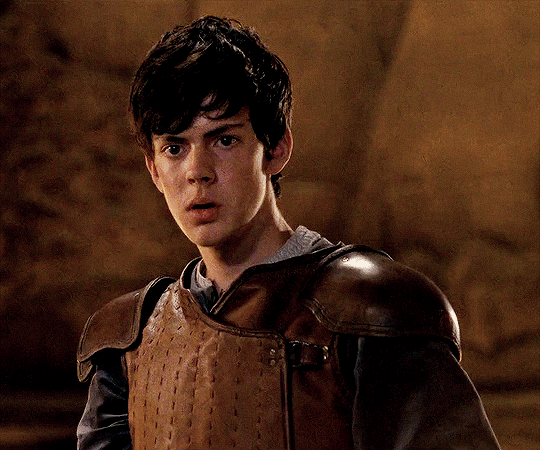xxsomewriterxx
10 posts
Don't wanna be here? Send us removal request.
Text
Susan: and what’s the main rule we have?
Peter and Caspian: don’t dare edmund to do stupid stuff
Susan: and why is that?
Edmund *with his head stuck in between stair railings*: i have no regard for my personal wellbeing
390 notes
·
View notes
Text
When Man Is a Myth
I. Stories of the High King Peter are myth more than anything else; the proof is in the name. It’s confusing at first glance. After all, the great feats attributed to him during his reign – the glorious Golden Age – are often true; the desperate victories, the plentiful feasts, and the seemingly endless balls all can be said to have really happened. The falseness lies underneath; the High King himself is the myth. That is the great secret: the High King never was, at least not in the way he has been painted. There never was that fearless, infallible, fiery king. The so-called “Magnificent” bled in battle. He fell quiet under the weight of the winter, silently praying for spring again. He laughed and shook and trembled. Somehow Narnia forgets this; somehow Narnia forgets the child, the son, the brother he really was. Peter the High King was always better known as Peter.
II. The Gentle Queen has become an interesting mix of truth and fiction. Too much about her was dutifully recorded, and her actions could never be fully lost; history remembers her grace and her duties in near-perfect clarity. However, in more wistful places, she has become the heroine of odd stories, and the villain of stories odder still. In the great cities beyond the desert, she has been turned into an enchantress known for stealing the hearts of men and then chaining them to their temples. Beside the quiet streams of her beloved Narnia, they whisper that the Queen Susan’s beauty was so radiant that few could bear to look directly at her. In the island marketplaces, it is said that her presence once brought great fortune to those who saw her. Every false legend is a funny twist on a simpler truth; a tale grown out of a friendly smile. In honest history, Susan is still truthfully remembered.
III. There are few lies to tell about the King Edmund, and few people who would risk the dishonour of lying about one once called “Just.” Instead he remains a quiet figure, written into history with all the other names and dates and details. Narnia remembers that a traitor may mend; Narnia remembers that a traitor may be just a child; Narnia remembers that a traitor may be just a boy in need of love and light and truth. Edmund is remembered in all of this, just as he remembers it himself. His feats are well-recorded; his battles and judgements and decrees and decisions pass through history relatively unscathed. His wisdom and passion are engraved within it; remembered long after he is gone. In the dark, he is a true tale of hope. In the light, he is still Edmund.
IV. The stranger the tale about Queen Lucy, the more likely it is to be true; the actuality of her being rivals even the most outrageous fictions. Valiant though she be, Lucy rarely went looking for trouble; she sought only the company of Adventure, and both joys and troubles lined her path. And so they say she is both fire and gold; they say she dances with wild folk, and swims out much too far, and laughs long after others have forgotten the joke. All of this is true. They say she is sharp in battle and gentle in wit. This is true, too. She used to wander into Cair Paravel barefoot, trailing sand beneath and behind her, and years later when sand blows in the open castle doors, they still say that the Valiant Queen must have let it in. This is home to Lucy, and she makes her home in the stories, so long as she can remain there.
2K notes
·
View notes
Photo





I know. You had it sorted.
EDMUND PEVENSIE in THE CHRONICLES OF NARNIA: PRINCE CASPIAN (2008) dir. Andrew Adamson
2K notes
·
View notes
Photo

In The Woods // E. Pevensie
Edmund Pevensie x Male Reader [ Golden Age ]
In which the witch in the woods isn’t quite what the Just King expected.
[ coming soon ]

#narnia#edmundpevensie#edmund#edmund x reader#edmund pevensie x reader#male reader#goldenage#golden age narnia#lucypevensie#peter pevensie#lucy pevensie#susan pevensie#edmund pevensie imagine#edmund pevensie#pevensie siblings#the chronicles of narnia
154 notes
·
View notes
Text
Lucy: Could I have a weapon, please?
Peter: Absolutely not.
[ three minutes later ]
Edmund: -okay so here we got spears, knives, arrows, my personal favorite is the sword but it’s all up to you, kid.
408 notes
·
View notes
Photo

“once there were four children” by Liridi on INPRNT
514 notes
·
View notes
Text










in the many years over which the pevensies became mythologized, one important thing was forgotten - when they first came to narnia, they were children
1K notes
·
View notes
Note
Thoughts on modern pevensies?
Sounds like fun here are some thoughts:
- Peter drives the car. This is The Rule. Sometimes he’ll swap out with Susan on a long drive, but Lucy is a terrifying driver and no one has a clue how she passed her test. Edmund always means to learn but never does, he just gets Peter or Susan to drive him
- Lucy loves to video everything. Maybe she’s a small vlogger, maybe she just loves filming things to keep the memories. Susan and Edmund act annoyed by it but they don’t really mind
- Edmund plays the bass guitar and while he will show off all day long with music written by others, he is intensely secretive about his own work
- Susan is a brilliant contemporary dancer and Lucy loves to film her performances
- They all often have each other on a call in the background if they’re apart. Even if they’re not talking, they just have one or more of the others in the corner of their screen or in an earphone
- Peter is a great cook, which infuriates Susan because she follows recipes very closely and her food only ever turns out ok, whereas Peter goes on instinct. He taught Lucy to bake, which she loves. Edmund is not allowed to cook because he will set off the smoke alarm
- Edmund and Lucy both love video games. Susan does not. Peter doesn’t really play but he somehow still possesses the magical big brother power of being able to get the younger ones past a hard level, which Edmund finds very suspicious
- Family board game night is a frightening affair. Eustace has been dragged along a few times and he does not understand why they are all fanatically committed to it even though they all end up furious
- As soon as they were all old enough, they started going on road trips together. Their annual road trip is sacrosanct in all of their calendars. The goal is usually to find the strangest, most obscure hidden gems and weird places they can
822 notes
·
View notes
Text
When Man Is a Myth
I. Stories of the High King Peter are myth more than anything else; the proof is in the name. It’s confusing at first glance. After all, the great feats attributed to him during his reign – the glorious Golden Age – are often true; the desperate victories, the plentiful feasts, and the seemingly endless balls all can be said to have really happened. The falseness lies underneath; the High King himself is the myth. That is the great secret: the High King never was, at least not in the way he has been painted. There never was that fearless, infallible, fiery king. The so-called “Magnificent” bled in battle. He fell quiet under the weight of the winter, silently praying for spring again. He laughed and shook and trembled. Somehow Narnia forgets this; somehow Narnia forgets the child, the son, the brother he really was. Peter the High King was always better known as Peter.
II. The Gentle Queen has become an interesting mix of truth and fiction. Too much about her was dutifully recorded, and her actions could never be fully lost; history remembers her grace and her duties in near-perfect clarity. However, in more wistful places, she has become the heroine of odd stories, and the villain of stories odder still. In the great cities beyond the desert, she has been turned into an enchantress known for stealing the hearts of men and then chaining them to their temples. Beside the quiet streams of her beloved Narnia, they whisper that the Queen Susan’s beauty was so radiant that few could bear to look directly at her. In the island marketplaces, it is said that her presence once brought great fortune to those who saw her. Every false legend is a funny twist on a simpler truth; a tale grown out of a friendly smile. In honest history, Susan is still truthfully remembered.
III. There are few lies to tell about the King Edmund, and few people who would risk the dishonour of lying about one once called “Just.” Instead he remains a quiet figure, written into history with all the other names and dates and details. Narnia remembers that a traitor may mend; Narnia remembers that a traitor may be just a child; Narnia remembers that a traitor may be just a boy in need of love and light and truth. Edmund is remembered in all of this, just as he remembers it himself. His feats are well-recorded; his battles and judgements and decrees and decisions pass through history relatively unscathed. His wisdom and passion are engraved within it; remembered long after he is gone. In the dark, he is a true tale of hope. In the light, he is still Edmund.
IV. The stranger the tale about Queen Lucy, the more likely it is to be true; the actuality of her being rivals even the most outrageous fictions. Valiant though she be, Lucy rarely went looking for trouble; she sought only the company of Adventure, and both joys and troubles lined her path. And so they say she is both fire and gold; they say she dances with wild folk, and swims out much too far, and laughs long after others have forgotten the joke. All of this is true. They say she is sharp in battle and gentle in wit. This is true, too. She used to wander into Cair Paravel barefoot, trailing sand beneath and behind her, and years later when sand blows in the open castle doors, they still say that the Valiant Queen must have let it in. This is home to Lucy, and she makes her home in the stories, so long as she can remain there.
2K notes
·
View notes

